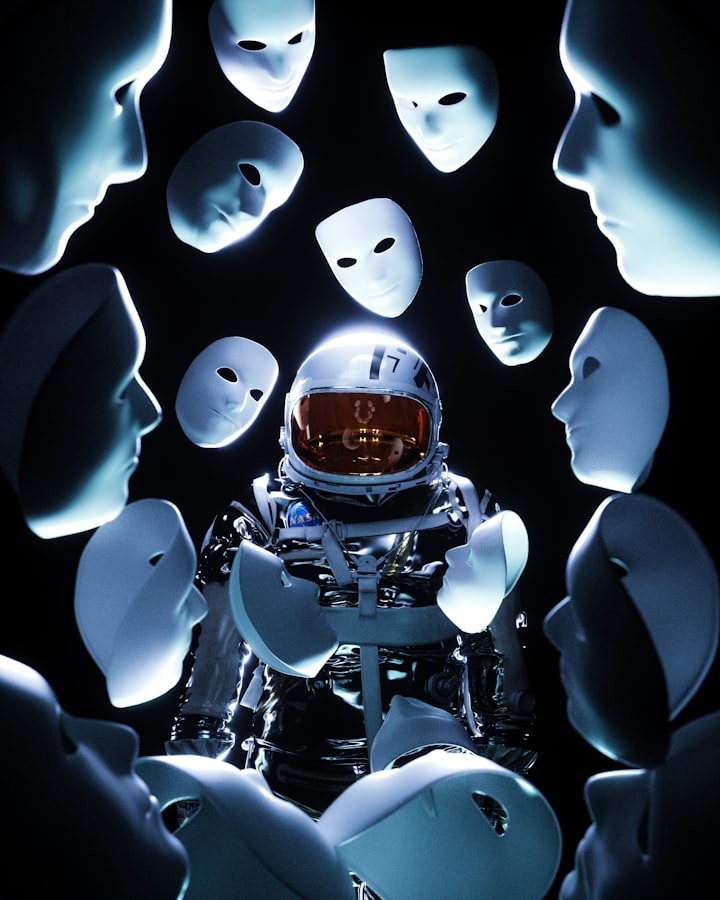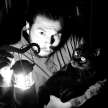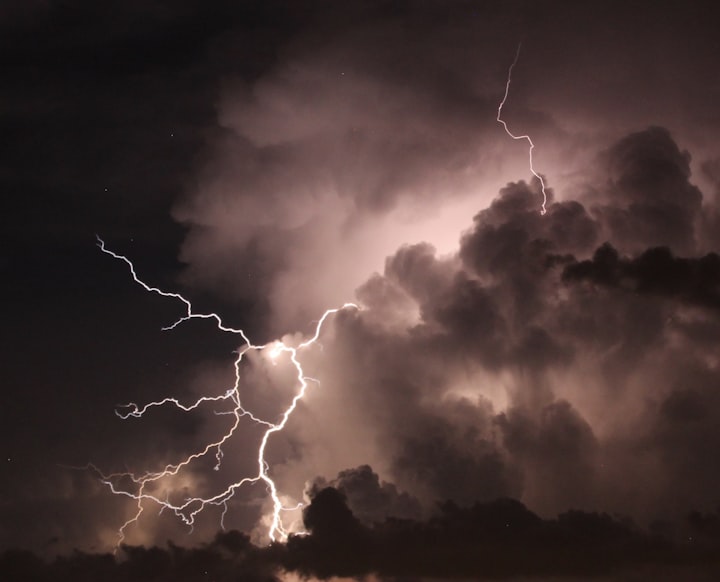The Cosmic Rehearsal
Have you ever had déjà vu?

Things that are abstract to human perception naturally belong to God - who or whatever that is to you. Time, mathematics, consciousness, the psychedelic experience: all property of the Cosmos, the spirit, and really can only be thought about or spoken on, never pointed out in our environment for someone to behold, like a temple, a canyon, or a jagged scar.
There are tethers within our reality that keep us together, common bonds that make things familiar. These tethers might be parallels to one another (because where do time and death really intersect, regardless of our perceptions of them?), and conscious beings serve as the bridges between them, because we feel, experience, and are influenced by such notions.
Scientists carved their art from the universal marble block that is mathematics, using language to craft their expressions. These shavings are used to deduce and locate facts about the functions of our reality, but ultimately provide no conclusive answers on what might actually be going on around us - or why, for that matter.
Science is the combination of math and language, so the goal and direction of these disciplines is entirely dependent on the civilization employing such fields of study. Since our Western world operates on coercion, economic collusion, and political corruption (the Evil C's), it isn't so far-fetched to assume our scientific models and desires are misguided and less than perfect.
Our affinities for violence and convenience (things that should never go hand in hand) have come together to produce the most destructive forces science can offer.
Regardless of the complexity these ideas introduce, we lead simple lives. Psychedelics are a catalyst for simplicity, a reminder of how deep and complex an idea or meaning can truly be - how plain our reality really is. Every ounce of mustered faith is moot in comparison to the power such substances offer through their experience.
Nature produced an avenue for cognitive reflection, insight, and communication that many would deem science fictional. Psychonauts and shamans are there to tell you that the effects of these drugs are real and they make room for positive growth. Some of the most powerful minds our species has ever had were under seemingly constant psychedelic influence.
In some cultures, consuming such a substance is considered a rite of passage, a milestone along the path of what it is to be human. The Eleusinian Mysteries of Ancient Greece come to mind, as do the mushroom cults of Mexico and Ayahuasca ceremonies in the Amazon.
Inside or outside an altered state of consciousness, our ability to percieve and reflect allows us to recognize and recall different kinds of patterns. Some of these patterns unfold in front of us in real time, a phenomenon Carl Jung called synchronicity. A series of coincidences occur together or in a certain progression, and these coincidences are meaningful instead of casual, and can almost be interpreted like a language (because of the ascribed meaning). Synchronization is a part of our daily lives and serves as a reminder of the complexity and interconnectedness of the universe, no matter how simply we might live.
Sychronization reinforces the idea of harmony. There is constant confirmation and reassurance within our environments, and it manifests itself in the form of what people label coincidences. Experiencing synchroncity while in a psychedelic state of mind is where the boundaries begin to dissolve (much to McKenna's delight), because things feel accessible and predetermined.
When events and actions seem to coordinate, almost as if they were practiced, it leaves a sensation comparable to déjà vu (and to think, dreams already have a monumental roll in these connections); "I've been here before, I'm certain."
If reality is well practiced then perhaps time isn't linear at all - perhaps we are always in these moments, executing the same actions, waiting to be revisited in our limbos of thought and habit. Jung sometimes called his theory the Principle of Togetherness.
Nothing in our universe seems to be independent, not even the abstract. Free will and the idea of a predetermined reality is a coin still caught in it's toss - no conclusion. Recognizing synchronization, especially in a psychedelic state of mind, might lead one to believe they are caught in a Cosmic Rehearsal.
We come complete with a character profile, numerous familiar settings, co-stars, authoritarian directors, and a whole lifetime worth of lines and stage directions. Consuming psychedelic substances gives the psychonaut a peek behind the sheet, a look over the script.
We find that we are cogs within an infinite mechanism, and that our consciousness is the height of human technology. It produces everything we think and use, and lays the blueprint for our behavior. It molded language, which has furthered our progress as a species more than anything because it allows us to communicate our intent and share our ideas; it brings the abstract into the material world.
The languages we employ are double edged, though, in the sense that they leave a lot of room for misunderstanding and fabrication. Secondhand revelations become common, where one person allows another to think for them, in essence communicating any false truth they desire.
This is where the value of the psychedelic experience can't be dismissed. It is a locally influenced, totally nutrient dependent plant that is a product of the universe and the friction within it.
The general purpose of nature seems to be to sustain life, seeing as how plants live in the same dirt for centuries and never foul it up. In fact, they tend to maintain and improve it, like great quiet sheperds of the soil. Psychedelic plants are a facet of nature and might also seek to sustain or even communicate messages from other lifeforms, as people such as McKenna and Hancock have argued.
Psychedelic plants are man's window, and perhaps doorway, into the normally invisible framework of himself and his environment. Coincidentally, psychedelics might also be nature's window into the world of cognitive function. Drugs like psilocybin and DMT are the rendevous for all facets of life, conscious or unconsious, being or nonbeing.
What is consciousness, and more importantly, where the hell does it come from? Conceptually, it allows for perception, which is the scope of a person's awareness; the bottleneck of what a person believes, the pigeonhole of one's understanding. If consciousness has the potential to be all knowing and incomprehensible (why wouldn't it?), our human perception is the cut off.
Our brain is like a kind of faucet for conscious reflection and interpretation, something to transport the greater essence. It can channel your thoughts and appeal to your emotion, but ultimately, the faucet is stopping up a whole lot of water, particularly if you haven't got a grasp on the spicket.
As humans, we can think of our brains as the bulbs along a string of Christmas lights. We all have the components to produce light, but we rely on the wiring and electricity to bring us what we need to make it happen. Consciousness is the cord connecting us internally, and helps us execute actions externally.
Our perceptions flicker to life on this string of lights, any color you can think of, but we are unaware of the outlet - no one knows why we are doing what we are doing, but we're doing it, and synchronization is maybe a sympton of so much energy being transfered and released.
McKenna's theory of novelty rests on such assertions: the longer things go on, the more likely some events are to occur. There isn't a messiah born every day, or even every century. Some things might only ever happen once, which is why I place so much value in synchronicity.
As for where consciousness comes from, I tend to favor McKenna's Stoned Ape theory. I think evolution brought some clever monkeys together who started eating mushrooms and other psychedelics in their free time, and being exposed to such states of mind helped them craft language in order to help share such experiences.
Psychonauts often agree that psychedelics spur people to talk, sing, make sounds in general. It's comfortable to be able to communicate ourselves and our feelings, and kind of frightening when we can't. My formula is:
Psychedelic consumption -> consciousness -> language ->
Once a species has a language, the very skeleton key to existence, any door can be opened. It's God and the denial of, it is every piece of furniture, architecture, and technology, and enables medical advancement like nothing else does. Without the ability to communicate a fact or idea, these concepts are useless.
If psychedelics gave us language, than that would make our consciousness a kind of gift from nature. What perplexes me is that it takes conscious effort to gift something... the type of fine tuned effort that would take millions of years to achieve, much like evolution. There is a lot of mystery around our cognitive ability, and McKenna believed that mysteries are just holes in a language - something that has yet to be described.
The more our languages evolve, the more mystery we will unravel. Operating under the assumption that psychedelics did bring us language, perhaps using such drugs will bring on the linguistic evolution we require to move forward, out of the shadow of industry and violence.
Language, art, math, our emotions... all of these are anchored to us and to each other through synchronicity. The consistency of coincidence testifies to the idea of novelty. The mushroom once suggested to me that synchronicity is the language of the universe - an open dialogue between the Cosmos and its subjects. Our natural habitats have watched us come to be for millions of years, and if it could communicate, would do so through environmental interactions.
This notion isn't far-fetched to me after experiencing substances such as psilocybin and salvia divinorum, and considering that nature is timeless and universal, and composes most every physical environment. The Cosmic Rehearsal is always in action, and the scenes are being rewritten as we move through them.
[2017]
____________________________________________________
This is another essay from the time capsule. If you found any of this thought-provoking, consider subscribing for more articles on psychology, consciousness, and the human condition. Thanks for reading!
____________________________________________________
About the Creator
Zack Graham
Zack is a writer from Arizona. He's fascinated with fiction and philosophy.
Current Serializations:
Ghosts of Gravsmith
Sushi - Off the Grid!
Contact: [email protected]
Reader insights
Outstanding
Excellent work. Looking forward to reading more!
Top insight
Heartfelt and relatable
The story invoked strong personal emotions






Comments (8)
Interestingly written 📝😉❤️
Really good 👍🏽
Love this line " Once a species has a language, the very skeleton key to existence, any door can be opened." I do not now why but that resonated with me. Thie was something I never even thought about
This is a fascinating take on psychedelics and its role in human language and self discovery. Such substances has a place in this world, we're just jor using them properly (in it's natural state) or respectfully.
Definitely philosophical. I love this sentence: "Scientists carved their art from the universal marble block that is mathematics, using language to craft their expressions."
I've listened to many a podcast with veterans and first responders who have nothing but positive things to say about MODERATED, CONTROLLED, and SAFE exposure to psychedelics that h greatly assisted them in overcoming demons and post-traumatic stress disorder (or at least manage it). I've also seen the terrible, long lasting effects of continued and unbridled exposure to drugs that have psychoactive and impairing effects on the brain. I am unfamiliar with some of the folks and terms you linked, and will definitely look into them. For now, I remain mostly convinced they should be used sparingly and by folks who need them for the aforementioned afflictions. Anyways, great essay and intriguing to say the least! You always structure these so well.
"Have you ever had déjà vu?" I think I've been asked this question before! Interesting article & ideas. I don't buy them, but I don't necessarily discount them either. I do find them fascinating. Well-written.
This is soooo deep and contemplative. I've had some expansive sessions as a psychonaut and agree with the vast majority contained in this article. Especially Synchronicity. It's obvious to some and beyond comprehension to others, perhaps, because of a religious wall they may have built to keep concepts like these away from their beliefs. What can't be denied is our collective experiences with terms like DeJa'Vu. We take it more literal than taking a deeper dive. I think the only thing I couldn't get past in this article is the concept of how language could have come about. It may have some logical merit, but it doesn't fit and implies that this is the only way the universe has designed language to evolve. It's like the universe would have to rely on animals to discover the mind-altering plants and realize the potential benefit which is not a good enough guarantee. Consciousness exists independent of language. I will, however read the link you provided to understand this more as a possibility. And thanks again for taking my mind to a place it hasn't been in a while. This is a great collection of connected information. Thank you.